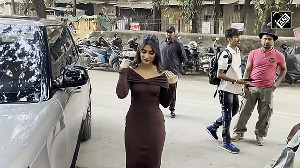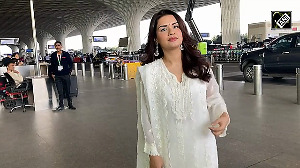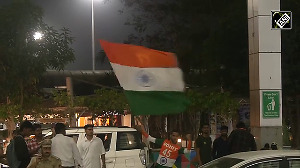Dr Karan Singh, deputy leader of the Congress Party in the Rajya Sabha has predicted more cooperation and understanding between the state and central government to alleviate the discontent of the Kashmiri people now that Ghulam Nabi Azad has taken over from Mufti Mohammed Sayeed as chief minister of Jammu and Kashmir.
In an interview with rediff.com in his suite at the Ritz-Carlton Hotel in Washington, DC, Singh, president of the Indian Council for Cultural Relations, said, "The change of course, was very clearly agreed to, and as you will recall three years ago when the election took place, the Congress was the larger party of the two, but Sayeed was very keen to have the first three years and Sonia Gandhi agreed."
Singh, who was visiting the US capital to check out properties for the establishment of a India Center in Washington, DC, said, "Really, there should have been no question about the change, but you know how it is in politics -- everything becomes headline news and all."
"I welcome this change and it is part of the political process there and I don't think that change in any way will come in the way of a settlement," he saidand added, "In fact, the ministry now will be even closer to the Centre because the Congress party is directly involved."
With regard to the recent activities of the All Parties Hurriyat Conference, Singh said, it has "been doing some rather strange things. You remember, first they came to Delhi and they wanted to meet our prime minister, (but) they met with (visiting Pakistani President Pervez) Musharraf. Then they said they wanted to go to Pakistan and meet with Musharraf. So we've taken a liberal attitude, although strictly speaking they broke the law by going to Muzaffarabad and then going on to Pakistan."
"But we said, 'Ok go' and then they came back and now they've come to talk again (with the government). I believe they are coming around to seeing the ground realities," he said.
However, Singh noted that the Hurriyat is split into so many factions "and by no means is an integrated part, but comprising a number of forces and adding to the lots of political forces in the Valley -- at least five political forces in the Valley, apart from Jammu and Ladakh, where the Hurriyat has no say whatsoever."
He acknowledged that despite the Hurriyat unravelling "they do have their own niche and their own role to play and I hope they will be positive about it".
With regard to his prognosis on the chances for a resolution of the imbroglio in Jammu and Kashmir, particularly in the wake of the recent burgeoning rapprochement between India and Pakistan, Singh, the son the last Maharaja of Jammu and Kashmir declared, "Let me say that I am mildly optimistic. I am not wildly optimistic, but only mildly optimistic, because there has been a lot of confidence building measures."
"So yes, the atmosphere is better, but there are of course constraints on both sides, but I am hopeful that we should be moving toward some kind of resolution," he added.
However, Singh said that the biggest confidence building measure would be if Musharraf sticks to the letter of his pledge to halt cross-border terrorism across the Line of Control into India. which still continues."
Describing the terrorist attacks in New Delhi "as such a terrible, terrible attak," Singh said, "Just imagine on the eve of Diwali. It's like here in the US, attacking on Thanksgiving or on Christmas eve and designed to do maximum damage."
He acknowledged, "One doesn't know really (who is responsible), but there is no doubt that the jihadi elements do have sanctuary and do have camps and all in Pakistan. There is no two views about that."
Thus, Singh said, "Musharraf will have to crack down on them and for his own good too, because while this sort of (terrorist) events go on, you'll appreciate it becomes very difficult for anybody to really try and move foreward politically."
Singh asserted that the Bush administration has to come down hard on Musharraf to stop cross border terrorism into India from Pakistan and argued that the US-led global war on terrorism has to also include infiltration into India by Pakistan-based jihadi groups and there can't be any double-standards over the effort to curb the scourge of international terrorism.
"We've made that very clear and this old argument that one man's terrorist is another man's freedom fighter and all that, is not acceptable at all, because clearly a terrorist is a terrorist, and if you want to fight politically, you can't put off bombs killing innocent people."
Singh declined offering any ideas or proposals he may have to resolve the Kashmir issue, saying, "I'd rather not discuss any concrete proposals in that connection because it a very delicate issue."
"My involvement in Jammu and Kashmir is a very long one and a very integral one, but I would rather not talk about solutions, I'd rather talk about the process and I'd rather say that let us hope that the process continues."
"Once the process gets going, then perhaps various solutions could emerge and we could talk about it. But to talk about solutions at this stage would be counterproductive because they will get shot down by everybody and then you lose momentum," he said.






 © 2025
© 2025